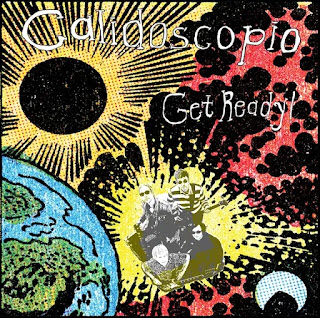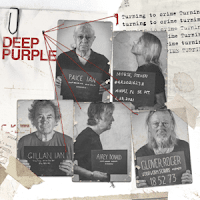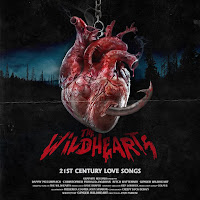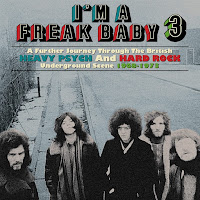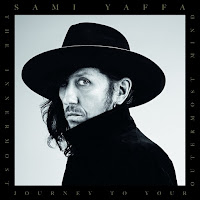New album releases in 200 words or less…
Calidoscopio – Get Ready! (Jargon Records)
Roaring out of the Flower City with sabers rattling and amps cranked up
to eleven, at first blush Calidoscopio sounds like just another talented bunch
of 1960s-styled garage-rock revivalists with six-string Sturm und Drang.
Further spins of Get Ready! reveal hidden charms, however. The album is
an international affair, members of Germany’s Golden Coats collaborating
alongside Rochester NY’s Dave Anderson, with guest performances from
Australia’s Joey Bedlam (Dollsquad) and garage-rock deity Sky Saxon (from
beyond the grave). While the LP cover gives off serious Jack Kirby/psych-rock
vibes, songs like the scintillating title track – with big beat drums, gang
vocals, and twangy fretwork – evince a timeless, electric, rock ‘n’ roll
sound. “The Lanky Gunman” mixes trembling ‘Spaghetti Western’-styled guitar
strum with wall-of-sound instrumentation and an eerie story-song while a
long-lost monologue from the Seeds’ frontman Saxon is integrated into “Green
Forest,” a spacey, hippie-rock screed. “Demon Child” honors its shockabilly
roots, benefiting from Bedlam’s breathless vox and Anderson’s jagged guitar
licks while the punky “Koko the Gorilla” mixes Hasil Adkins with the Electric
Prunes for a raucous good time. Calidoscopio’s Get Ready! provides a
mind-bending trip back to the future with a timeless sound that is both
familiar and yet innovative.
Grade: A
BUY!
British rock legends Deep Purple are in their sixth decade as a band and although they’ve never been adverse to recording the odd cover song (their 1968 hit “Hush” comes to mind), they’ve so far resisted the urge to record an album exclusively of covers…until now. Turning To Crime is a collection of twelve of the band’s favorites, ranging from bluesy 1950s-era R&B (Huey ‘Piano’ Smith’s “Rockin’ Pneumonia and the Boogie Woogie Flu”) and ‘60s psych (Love’s “7 and 7 Is”) to blues-rock (Cream’s “White Room”) and beyond. Although the current band is quite adept at playing any sort of music, Gillian’s aging pipes betray his intent at times. Still, Turning To Crime is quite the live wire, the band pulling off the performances more often than not. Fleetwood Mac’s classic “Oh Well” is given an altogether new coat of (hard rockin’) paint, the Yardbirds’ “Shapes of Things” is provided a stout psychedelic-pop sheen and, surprisingly, Little Feat’s “Dixie Chicken” is an excitingly funky strut. Bob Seger’s “Lucifer” is a deep-cut that mixes guitar-driven hard rock and Memphis soul, but it’s the album-closing Southern rock-inspired medley (with tunes by Booker T, Don Nix, Gregg Allman, and Steve Winwood) that will turn heads. Grade: B+ BUY!
Tom Guerra – Sudden Signs of Grace (Casa del Soul Records)
Tom Guerra began his career nearly 40 years ago as a member of outfits like the Dirty Bones Band and the Mambo Sons. Guerra launched his solo career with 2014’s All of the Above and came to our attention with 2018’s acclaimed American Garden. Recorded during the pandemic, Guerra’s fourth solo effort, Sudden Signs of Grace, offers up everything that’s great about the artist – finely-crafted songs, hypnotic melodies, intelligent lyrics, and stellar guitarplay, all neatly packaged into three-minute, radio-friendly songs. Although Guerra dishes up a couple of nifty covers here – perfectly capturing the angst of Eddie Money’s “Gimme Some Water” with his fiery guitarplay while Harlan Howard’s country classic “The Streets of Baltimore” is provided a suitably melancholy, twang-drenched performance – it’s Guerra’s original material that really shines. “Lonely No More” is a gorgeous power-pop song with Duane Eddy-inspired guitar and winsome vocals; the jaunty “Lover’s Time” is a charming amalgam of the Byrds and Big Star; and the honky-tonk flavored “Down the Farm” rides on Guerra’s rapid-fire vocals, rollicking piano-play, and wiry fretwork. There’s not a duff track to be found on Sudden Signs of Grace, Guerra delivering an inspired collection of rock ‘n’ roll full of heart and soul. (See the video, below!) Grade: A BUY!
The Specials – Protest Songs 1924-2012 (Island Records)
God bless ‘em, the Specials still crank it out 40+ years after the band’s exhilarating debut. Breaking up in the mid-‘80s, several members reunited in 1993, and they’ve carried on ever since, releasing a handful of albums since reuniting, including 2019’s critically-acclaimed Encore. Crucially, the current line-up includes Specials’ founders Terry Hall, Lynval Golding, and Horace Panter. Protest Songs 1924-2012, is an exciting collection of themed cover songs inspired by the George Floyd protests of the summer of 2020. An eclectic collection it is, too, including classic material by the Staple Singers, bluesman Big Bill Broonzy, Bob Marley, the Dixie Jubilee Singers, and Frank Zappa, among others. The Specials are a long way from their days as ska revivalists, pursuing a soulful, R&B-drenched sound as evinced by their reading of Pop Staples’ powerful civil rights ode “Freedom Highway.” The Mothers of Invention’s “Trouble Every Day” is provided an appropriately menacing tone, complete with scorching guitars, while Leonard Cohen’s “Everybody Knows” is sung in Cohen’s droll style. The Wailers’ “Get Up, Stand Up” offers a powerful, albeit subdued performance that emphasizes Peter Tosh’s defiant lyrics. Totally unexpected, but pleasantly surprising, the Specials’ Protest Songs is one for the ages. Grade: A- BUY!
The Wildhearts – 21st Century Love Songs (Graphite Records U.K.)
Wildhearts founder Ginger got the gang back together in 2012 for a series of gigs that led to a live album, but the reformed band wouldn’t go into the studio until 2019’s acclaimed Renaissance Men. With the brand-spankin’-new 21st Century Love Songs, the band comes full-circle, delivering its 10th studio work. It’s a real banger, too, with plenty of the Wildhearts’ trademark melodic hard rock that often times teeters on the razor’s edge of heavy metal. For instance, the album-opening title track hits your ears like a sledge, combining an erudite Mott the Hoople-style of British rock ‘n’ roll with thrashy molten slag. Much of the rest of 21st Century Love Songs follows a similarly-skewed blueprint: “Institutional Submission” sounds, at times, like Killing Joke on steroids until the vocal harmonies and elegant fretwork chimes in while “Sleepaway” could pass for a harder-rocking Cheap Trick. Underneath the instrumental clamor you’ll unearth undeniable melodies, often accompanied by football hooligan harmonies running interference for Ginger’s sweeter tones. Ginger could have been a hella successful pop star if he’d chosen a less debauched path but, lucky for us, he’s walked a sleazier, obstacle-strewn road to rock ‘n’ roll nirvana for almost 30 years now. Grade: A BUY!
Various Artists – I’m A Freak Baby 3 (Grapefruit Records/Cherry Red U.K.)
The late ‘60s and early-to-mid-‘70s provided an abundance of interesting rock ‘n’ roll as bands discovered their muse and experimented musically. This is the third volume in the U.K. archivists Grapefruit Records’ “Freak” series, exploring the exciting new sounds of 1968-1973, and it’s every bit as entertaining as the first two sets. Featuring 53 songs spread across three discs, they follow a simple blueprint – offer a few scattered obscurities by well-known bands (Free, Thin Lizzy, Deep Purple, Uriah Heep, Mott the Hoople, Procol Harum) and mix in songs by lesser-known but period-essential groups (Hawkwind, Spooky Tooth, Stray, Trapeze, Nazareth, Tear Gas). It’s when the madmen at Grapefruit dig into the pits that it gets really interesting, though, and I’m A Freak Baby 3 also includes rare (collectible) 7-inchers from diverse artists like Quatermass, Mighty Hard, Curtis Knight Zeus, and Steam Hammer and then caps off the set with previously-unreleased music from folks like Stack Waddy, T2, Red Dirt, Wicked Lady, and the Yardbirds (!). Toss in toons by cult rockers like Leaf Hound, Killing Floor, Third World War, and Budgie and you have yourself a party, I’m A Freak Baby 3 providing a lot of bang for yer hard-earned buck! Grade: A BUY!
Sami Yaffa – The Innermost Journey To Your Outermost Mind (Livewire Records)
After 40 years in the trenches, former Hanoi Rocks and New York Dolls bassist Sami Yaffa finally got around to recording a solo album and, as one might expect, it’s a flamethrower. Yaffa approaches rock ‘n’ roll with a fierce Johnny Thunders/Stiv Bators aesthetic and songs like the album-opening “Armageddon Together,” a devastating take on modern religion, reflect this crash ‘n’ burn style of hard rock. There’s more than meets the eye here, tho’ – Yaffa’s undeniable sense of rhythm adds melody to cod reggae tunes like the mesmerizing “Rotten Roots,” which crosses the Clash with Lee “Scratch” Perry or “You Gimme Fever,” which pairs a deep Sly/Robby groove with lusty lyrics and elegant fretwork to great effect. “Fortunate One” flat-out rocks (not dissimilar to Lords of the New Church), with Yaffa’s whiplash vox punctuated by Michael Monroe’s bleating saxophones while “Germinator” slaps yer eardrums like a nail-studded baseball bat, fueled by Monroe’s raging harmonica and guitarist Christian Martucci’s razor-blade licks. “Cancel the End of the World” sounds downright Pink Floydish, with lofty vocals and gorgeous, atmospheric instrumentation. Yaffa is no one trick pony, displaying the many facets of his enormous instrumental and songwriting talents with The Innermost Journey… Grade: A- BUY!
Previously on That Devil Music.com:
Short Rounds, September 2021: Marshall Crenshaw, Crack The Sky, Donna Frost, Mark Harrison & the Happy Tramps, Christone ‘Kingfish’ Ingram, the Rubinoos, and Jon Savage’s 1972-1976
Short Rounds, June 2021: The Black Keys, the Bummers, Michael Nesmith, Greg “Stackhouse” Prevost, Quinn Sullivan, and the Vejtables
Short Rounds, April 2021: Peter Case, The Fortunate Few, David Olney & Anana Kaye, Sour Ops, Joe Strummer, and the Thieves

